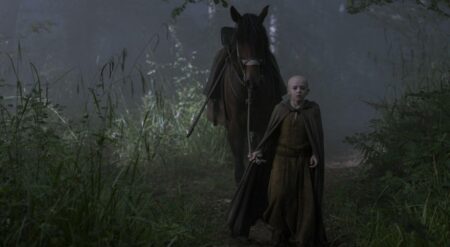As we enter the next stages of our lives, so do our parents, and it isn’t easy. Forget You Not finds a balance between tackling the existential headspace of its father-daughter duo and finding the spots of joy. It’s honest in its delivery, making the heartbreak that comes almost excruciating as the inevitable draws into focus. The time taken to flush out this relationship is well-used, even if it comes at a deeply emotional price. This makes Forget You Not not an easy watch, but a necessity. In a way, it prepares us for the end.
Forget You Not focuses on Cheng Le-le (Hsieh Ying-xuan), a married woman who, on the surface, lives a fairly normal life. By day, she works at a convenience store, and at night, she is a comedian at the nighttime comedy club, Talk Show. However, normalcy doesn’t mean that life is perfect. At the start of the series, her world is shattered when her father, Cheng Kuang-chi (Chin Han), is diagnosed with early-stage dementia, putting her in the role of a caregiver but also forcing her to confront the idea of impermanence.
In this process, she reflects backward. Memories take hold, a normal occurrence when confronted with transitional points in life. From memories of her father accidentally leaving her behind in a Night Market to the last moments she had with her mother, to even reminiscing over how her relationship with her husband, Zhang Kai (Wallace Huo), devolved, Le-le drifts back to the past to understand her present. Despite having two friends in her corner, Le-le is left alone to grapple with the emotional ramifications of her father’s decline.
Journeying from past to present and back again gives a sense of displaced time. This feeling works well with Le-le’s sense of discombobulation throughout the series, as her mind wanders from memory to memory searching for answers that don’t easily come. There are no easy answers in Forget You Not, but the ease with which writers Tsai Pao-chang, Ho Shing-ming, and writer/director Rene Liu grapple with the complexities of this stage of life resonates onscreen for both father and daughter.
Forget You Not soars on the strength of its father-daughter relationship.

While much of Forget You Not focuses on Le-le and her navigation of things, it is also on Kuang-chi, who enters the last stage of his life. Chin Han is astoundingly good, working with Rene Liu’s direction and taking complete command of every scene he’s in. The first episode introduces Kuang-chi, who has always been a funny goofball with a big heart. He’s so darn charismatic that you can’t help but adore him, even at his most frustrating.
Establishing Kuang-chi at such a high energy level in the first episode makes the transition to his lowest points difficult to witness. Much like Le-le, the only impression has been of a man full of life and vitality. As Chin Han peels back the layers of Kuang-chi’s mind, balancing between the character’s lucidity and decline, the pain of what is to come further intensifies.
Hsieh Ying-xuan clings to pain and confusion as her Le-le experiences the varying stages of grief. Honestly, it’s a testament to the writing, direction, and her acting that her emotional process and reactions are undeniably relatable in the series. Her only source of comfort—comedy—fails her as she tries to process everything. The club manager even points out that people come to the club to escape, not be reminded of the struggles of the real world. But if she is the one they are coming to for escape, where is she left to go?
The isolation further intensifies as Le-le goes from daughter to caretaker, which is never an easy transition, especially if you’re dealing with someone with deteriorating cognitive and motor functions. As a warning, certain scenes between Le-le and Kuang-chi are incredibly uncomfortable, yet understandable on both sides. This transition from daughter to caretaker and father to invalid never veers into black or white territory. Instead, there is a continuity of honesty that never shies away from revealing the complicated and occasionally ugly emotional journey this transition brings.
Finding life’s joys, however big or small, allows us to live life fully.

This is one of many moments connecting to the overarching theme of impermanence in Forget You Not. Nothing is meant to last, and for Le-le and Kuang-chi, we see what both run away from and reach toward. Their grief is an emotional reckoning, where one courts isolation over friendship, cohabitation over independence, both seeking the opposite yet never straying from the relatability of the human experience.
Impermanence also takes on many other forms outside of death and dying in the series. The end of a marriage, childhood abandonment, and the loss of free time, among other things, all impact separately from the more encompassing main storyline between Le-le and Kuang-chi. The series’ writers remind us that everything ends, but it doesn’t have to be bad.
Exploring the past and focusing on the smaller random pockets of joy between Le-le and Kuang-chi reveals a clear takeaway in Forget You Not: Finding joy in life enables us to survive. It enables us to accept the moments that rattle us, threaten to break, and leave us behind. And it’s okay to wallow in them, if only for a little while. It is easy to forget the good that happens in our lives, but these good moments can help us survive and pull through in the end.
Forget You Not walks its characters and the audience through the varying stages of grief. It is honest, yet never cruel in its delivery. Instead, it shines a much-needed light on the struggles of life transitions, particularly the role reversals between parent and child. It opens up a much-needed conversation on impermanence and how we confront it in times of crisis and change.
Forget You Not is now streaming exclusively on Netflix.
Forget You Not
-
Rating - 9/109/10
TL;DR
Forget You Not walks its characters and the audience through the varying stages of grief. It is honest, yet never cruel in its delivery.







